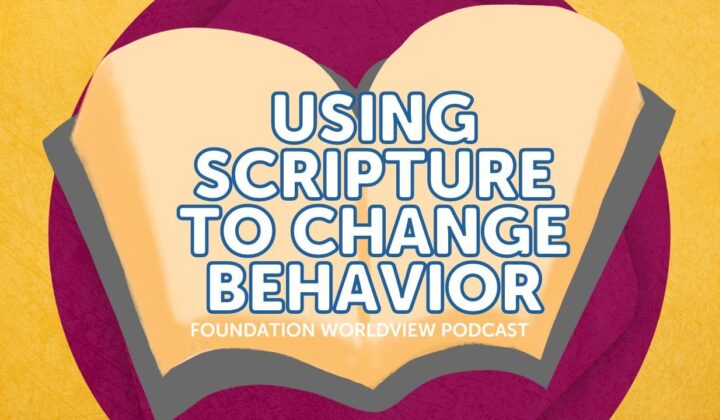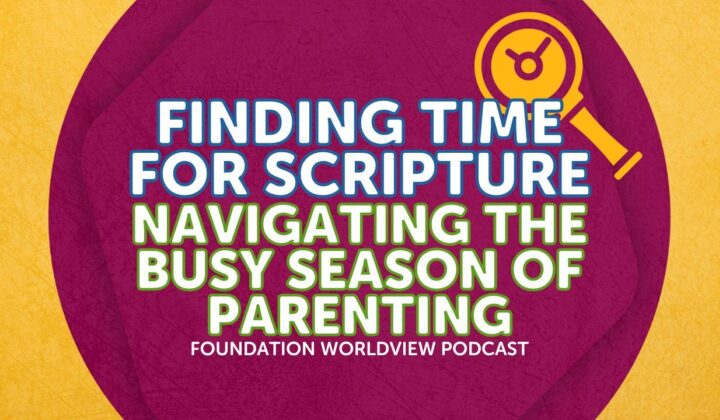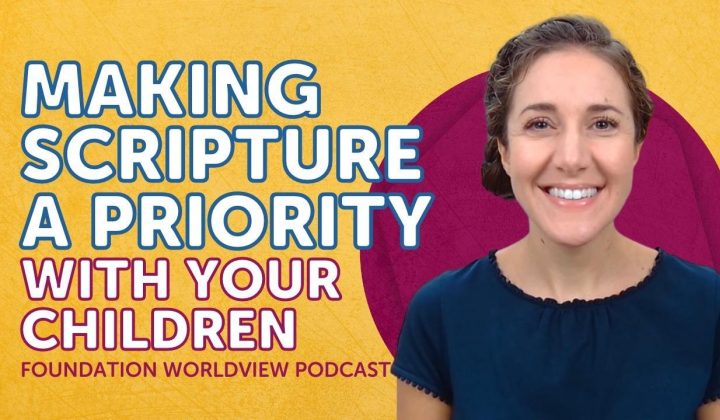Learn more about the journey that led to us equipping kids to carefully evaluate every idea they encounter.
Meet members of our team who have contributed to curriculum development.
Hear from real users of the Foundation Curriculum.
Learn what we believe about God, Jesus, Scripture, and more.
Explaining Complacent Christianity to Children
In this episode, we dive into how to explain complacent Christianity to your children—addressing love of wealth, lack of hospitality, and more. Learn how to guide your kids toward a biblical understanding of what a faithful Christian life should look like, even when those around them in the church may not reflect it. Tune in for practical advice on helping your children recognize and embrace true Christian living.
Transcript
Note: The following is an auto-transcript of the podcast recording.
Hello friends. Today's question is, "How do we explain complacent Christianity to our children? For example, love of wealth, lack of love for God's word and the poor, no hospitality, et cetera. In our home, we are reading and trying to show the truth from God's word about what the Christian life should look like. We have experienced this problem in multiple churches."
It's a really interesting question. How do we help our children understand biblically what the Christian life should look like when many of the families around us, maybe even in our churches, don’t live as the scriptures represent? How do we do this well? How do we help our children taste and see what Christianity truly should look like?
That's the question we're going to dive deep into answering today here on the Foundation Worldview Podcast. My name is Elizabeth Urbanowicz, and I'm the host of this podcast, where we seek to answer your questions so that you can equip the children that God has placed in your care to carefully evaluate every idea they encounter and understand the truth of the biblical worldview.
Now, as we think about this question, I’m going to respond with a question that faithful listeners of this podcast will likely already know. That question is: What is the goal? When we think about wanting our children to see Christianity as it is presented biblically, versus what they will encounter in the culture, and even in the church, I think our goal here is threefold. I’m going to present the threefold goal that I believe we should aim for.
The first part of the goal is to have our children taste and see what biblical Christianity should look like. We want our children to actually experience this, as the questioner mentioned. This is something they are trying to do in their own home. That’s the first part of the goal. The second part is to explain why biblical Christianity is not always what our children will see, even within many Christian families. We must prepare them for this and explain it biblically. Why is this so? The third part of the goal is to cultivate hearts of gratitude in our children instead of a spirit of judgmentalism. As we help them see what true biblical Christianity is like and explain why they aren’t seeing it in many Christian homes, we want to ensure their hearts are focused on gratitude, not judgment towards others.
Before we dive deep into these three goals and how we can accomplish them, if you’ve found the content of this podcast beneficial, please make sure to like and subscribe so you don’t miss future episodes. I also ask that you invest two seconds to rate this content. Rating it helps get it in front of more people so that we here at Foundation Worldview can reach our goal of equipping as many Christian adults as possible with the skills they need to help their kids think critically and biblically.
Now, for the first part of our goal: We want our children to taste and see what biblical Christianity should look like. It sounds like the questioner is already doing this in their home, but for everyone watching or listening, here are some tips for ensuring your children experience Christianity as it’s described in Scripture. If you'd like more information or in-depth teaching on this, I highly recommend checking out our parenting series at Foundation Worldview. You can get the first video, which goes in-depth on this topic, for free. Just go to FoundationWorldview.com and check out the parenting series.
First, we need to ensure we are cultivating our children’s hearts—the relationships we are establishing with them—because the gospel is all about relationship. God the Father sent God the Son to live the perfect life we could never live, to die in our place, to rise again to new life, and to return to Him in heaven. Then, He could send His Spirit into us, who are now redeemed and reconciled to Him. The gospel is all about relationships. If we want our children to understand biblical Christianity, we need to ensure we are cultivating strong relationships at home, reflecting God the Father’s heart to our children.
Some ways we can cultivate these strong relationships include spending time with our children and working towards common goals, like doing projects together. Around the house, it can often be quicker to do tasks ourselves, but partnering with them in cooking meals, cleaning, or fixing things helps build relationships. It’s also important to play with our children. Those of you who have listened to the Foundation Worldview podcast for a while know I’m not a parent; my experience is in the classroom. But even in the classroom, I made it a goal to play with my students during recess once a week. These playtimes strengthened our relationships.
It’s also vital to practice confession and repentance within our homes. Sin always damages relationships, and there will be sin in our homes because we are sinners. We will sin against our children, and they will sin against us and each other. We need to practice biblical confession and repentance to restore relationships.
Next, we need to cultivate our children’s hands—the rhythms and routines we establish at home. They need to understand what Christian practices look like. We must ensure that reading Scripture and praying together are daily practices in our homes. It doesn’t need to be a lengthy time; even five minutes around the breakfast table can make a difference. We also need to make corporate worship on Sundays a priority so that our children understand the Christian life is meant to be lived with the body of Christ.
Finally, we must equip them with biblical literacy and thinking skills—their heads. We want our children to be able to soundly read, interpret, and apply Scripture so that they can discover who God is and the truths He has revealed. If your children are ages eight and up, I highly recommend checking out our Studying the Bible Curriculum at Foundation Worldview. This curriculum equips kids with the skills to soundly read, interpret, and apply Scripture on their own.
The second step in our goal is to explain why Christianity often looks different in many Christian families. We want to ensure this explanation is anchored in Scripture. A great passage for this is Ephesians 6:10-18.
We can also read James 1:22-25 with our children to show that hearing God’s word but not following it is a common human experience. We must emphasize the importance of seeking God through obedience, not perfection.
Lastly, we want to cultivate hearts of gratitude in our children instead of judgment. When explaining why we make certain decisions in our homes, like prioritizing worship or limiting screen time, it’s easy for children to develop a critical attitude. We must help them see that it’s not their job to judge others but to be grateful for God’s grace in their lives.
A great passage to instill this gratitude is Psalm 19:7-11. We can go through it verse by verse, discussing the goodness of God’s commands and thanking Him for His guidance.
Well, that’s a wrap for this episode. If you have a question you’d like me to answer on a future Foundation Worldview podcast, you can submit it at FoundationWorldview.com/podcast. As we leave our time together, my prayer for you is that, no matter the situation you and the children in your care find yourselves in, you would trust that God is working all things together for your good, using all things to conform you more into the image of His Son. I'll see you next time.
Related Posts and insights

Using Scripture to Change Children's Behavior
Today's question says, "In a previous podcast, you address the question, how should we as parents balance teaching how to correctly study scripture and also take the time to teach the moral lessons too? You explain the concept well, but didn't give any practical examples of how scripture should inform our children's behavior. Can you give some practical examples about how to do that?"

Finding Time for Scripture: Navigating the Busy Season of Parenting
In this episode of the Foundation Worldview Podcast, host Elizabeth Urbanowicz addresses the question of how to find time to read Scripture when you have multiple young children. She emphasizes the importance of recognizing that this season of parenting is different and requires different expectations, but cautions against using it as an excuse to neglect time in God's word.

Making Scipture A Priority With Your Children
Elizabeth Urbanowicz shares examples of how her parents modeled scripture being the utmost importance while growing up.





